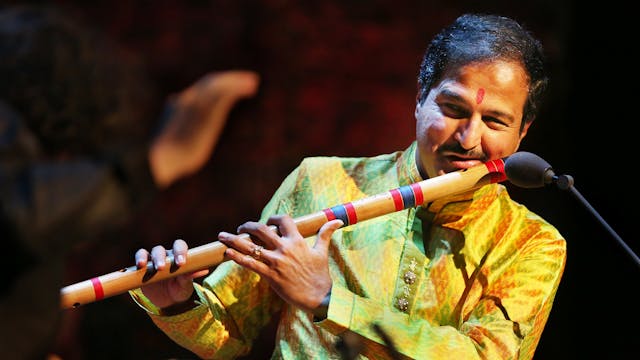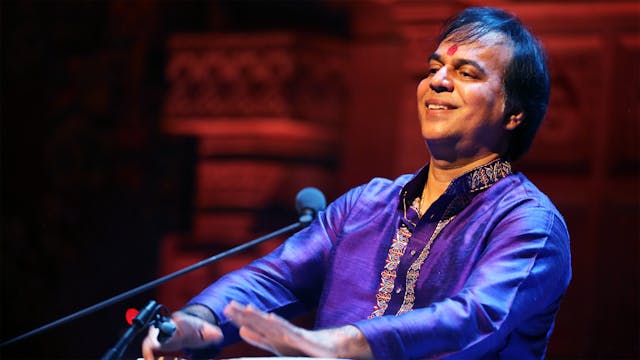Recorded at Darbar Festival 2018, on 25th October, at Milton Court Concert Hall, at the Barbican, London.
Musicians:
- Meeta Pandit (khayal)
- Mukundraj Deo (tabla)
- Tanmay Deochake (harmonium)
- Priya Sharma & Mithila Sarma (tanpura)
Raag Bageshree; Thaat: Kafi; Samay: Night
Raag Tilak Kamod; Thaat: Khamaj; Samay: Night
Pandit performs Raag Bageshri in her delightful, deep voice in this episode. She improvises the raga in authentic Gwalior style using the lyrics of the compositions (bolalaaps and boltaans) and creating crystal clear and sharp crests and troughs in the lower, middle and upper octaves. Thereafter, she sings Raag Tilak Kamod, another beautiful evening raga.
Belonging to the sixth generation of an unbroken lineage of musicians, Pandit’s performances showcase the best, the most genuine in Indian classical forms with an appeal and romance that is unique. “Being an artist or performer is not a walk in the garden; One needs single-minded determination to be on that path, it is a difficult profession for men and for women in particular because one needs to step out of the house for performances. One needs a strong support system to pursue this profession,” she says.
Deo and Deochake provide excellent support on the tabla and harmonium.
Meeta Pandit is the first woman in her family to take up music as a profession. This career move did not come as a surprise in case of Meeta for she already had this in mind. The timing of it though was pre-emptive. It has a rather disconsolate story associated with it – the sudden death of her brother, Tushar Pandit in a road accident. Meeta learned music first from her grandfather, Late Krishnarao Shankar Pandit and then her father, Lakshman Krishnarao Pandit. As a child, she immensely enjoyed her practice sessions and immersed herself into learning the nuances of the Gwalior style. Her confidence as a performer became solid due to the frequent exposures she was put through by her father in small, private soirees where she performed with 100 percent commitment. An exponent of such an age-old Gharana which is also the mother of all Gharanas in North Indian Classical music, Meeta has a very open mind and considers change to be a constant in any art form. This openness is what, she thinks, will help connect an age-old art form with the younger generation.
Deo was initiated to music at an early age. He mainly drew inspiration from his mother, Dr. Mrs. Manjiri Deo who is herself a renowned kathak dancer in India.
Deochake received preliminary lessons from his grandfather Gopalrao Deochake. He took advanced training in Harmonium from Pramod Marathe and at present he is taking lessons from Pandit Ulhas Kashalkar & Pandit Suresh Talwalkar. Tanmay is a talented and well established and makes for a great accompanist in demand.
Up Next in Season 11
-
S11 EP3 Lalgudi GJR Krishnan and Vija...
Recorded at Darbar Festival 2018, on 27th October, at Milton Court Concert Hall, at the Barbican Centre, London.
Musicians:
- Lalgudi GJR Krishnan (Carnatic violin)
- Lalgudi Vijayalakshmi (Carnatic violin)
- Trichy Sankaran (mridangam)
- Giridhar Udupa (ghatam)
- Mithila Sarma (tanpura)R...
-
S11 EP4 | Rupak Kulkarni
Musicians:
- Rupak Kulkarni (flute)
- Ojas Adhiya (tabla)Raag Jog; Thaat: Kafi; Samay: Night
Raag Puriya; Thaat: Marwa; Samay: Night“Belonging to a family of musicians comes with a great advantage because you get an exposure to stage performance and of facing larger audiences from a very te...
-
S11 EP5 | Sanju Sahai
Recorded at Darbar Festival 2018 on 27th October at the Milton Court Concert Hall, Barbican Centre, London.
Musicians:
- Sanju Sahai (tabla)
- Tanmay Deochake (harmonium)
Tabla solo in TeentaalIn this magical performance, Sahai begins with a dazzling Uthaan in pure Benares style, a prolonge...



